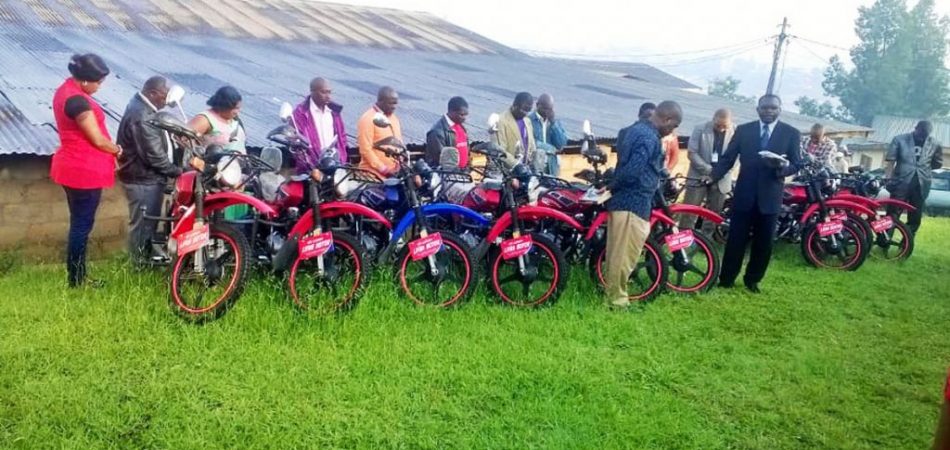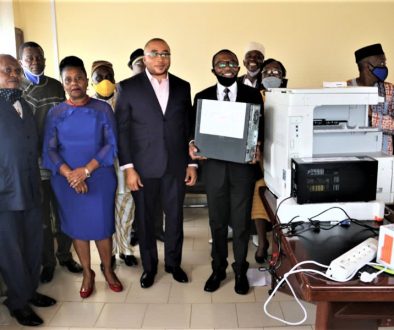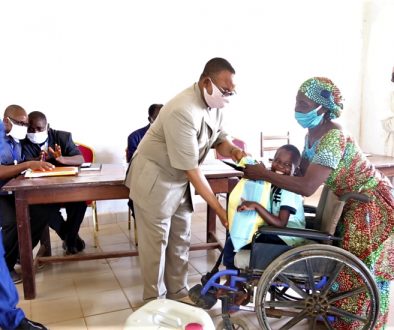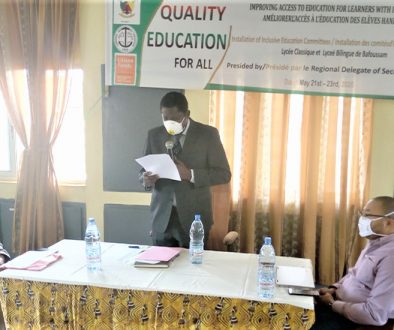CBR Workers to Reach More PWDs Using New Bikes
Written by Fru Rita Ngum
Edited by Njoka Divine & Mufuh Ramiro
Movement into the hinterlands has been very challenging for Community Based Rehabilitation (CBR) field workers who have had to brave long distances and very bad roads to offer services to Persons with Disabilities (PWDs). To make their work more effective, the field workers have been using motorbikes to get to these hard-to-reach communities. They have been using the same bikes for the past five years.

Moses Jab, CBR field worker for Donga Matung Division, tells me that over time the motorbikes depreciated and were no longer effective for transportation. This posed problems in that the field workers were unable to cover areas assigned to them, resulting in an increase in the number of preventable disabilities in the community, he explains.

In order to address this growing concern, the CBC Health Services (CBCHS) through its Socio Economic Empowerment of Persons with Disabilities (SEEPD) program procured and handed seven new motorbikes to six Community Based Rehabilitation (CBR) field workers from seven divisions of the Northwest Region. Another motorbike was handed to the Head Teacher of the Cameroon Baptist Convention (CBC) Inclusive School and Sign Language Center.
The CBCHS’ Chief of Administration and Finance (CAF), Mr. Warri Denis handed the motorbikes on March 16, 2018. This was during a traditional morning devotion at the DHS Central Administration in the presence of the SEEPD Program Manager, CBR Supervisor, Senior Administrator of the AIDS Care and Prevention (ACP) program and CBCHS Central Administration staff.
While handing over the motorbikes, CAF congratulated the SEEPD program for working hard to procure them. Above all, he appreciated CBM AusAid for always providing funding to the SEEPD program. Mr. Warri called on the CBR field workers to use the motorbikes for the effective implementation of the CBCHS mission statement. This he reiterated would be achieved through meeting the needs of persons with disabilities in the hinterlands.
He used the opportunity to appreciate CBR field workers for working relentlessly in the different communities to prevent disabilities while also ensuring that those already with disabilities are empowered and linked to rehabilitation services.
The Administrator of the AIDS Care and Prevention Program (ACP), Pastor Bambo Denis, exhorted the field workers as well as all present using Psalms 104. He further dedicated the motorbikes and the riders to God entreated God for guidance and protection against accidents.
Speaking to the CBCHS press, the SEEPD Program Manager, Mr. Awa Jacques Chirac, said the objective of the program is to improve on the quality of life of persons with disabilities. He was optimistic that the motorbikes will facilitate work the work of field workers as they seek to penetrate different communities.
Mr. Awa Jacques Chirac challenged the field workers to use the bikes and go into further remote areas especially where they have never been before to demonstrate the mission statement of the CBCHS, which does not exclude any one.
CBR Supervisor, Mr. Kenchi Joseph says his desire is to see the quality of work improved in the community as a result of the replacement of the old motorbikes with brand new ones. He describes the new motorbikes as ‘quality tools for work’.
Carine Fortu, CBR field worker for Momo Division (lone female biker), on behalf of all CBR field workers appreciated CBM for making the purchase of the motorbikes possible. These bikes she explains will motivate them to do more.
“We can now be able to get into more communities that we’ve never been to, and more persons with disabilities will benefit from our services by accessing livelihood opportunities,” says Carine Fortu.
CBR’s objective is to ensure that Persons with Disabilities (PWDs) make maximum use of their potentials and to access regular services and opportunities to become active contributors to the wellbeing of their communities. In this light, the program works in different communities of the Northwest Region for identifications, referrals and rehabilitation of PWDs.



